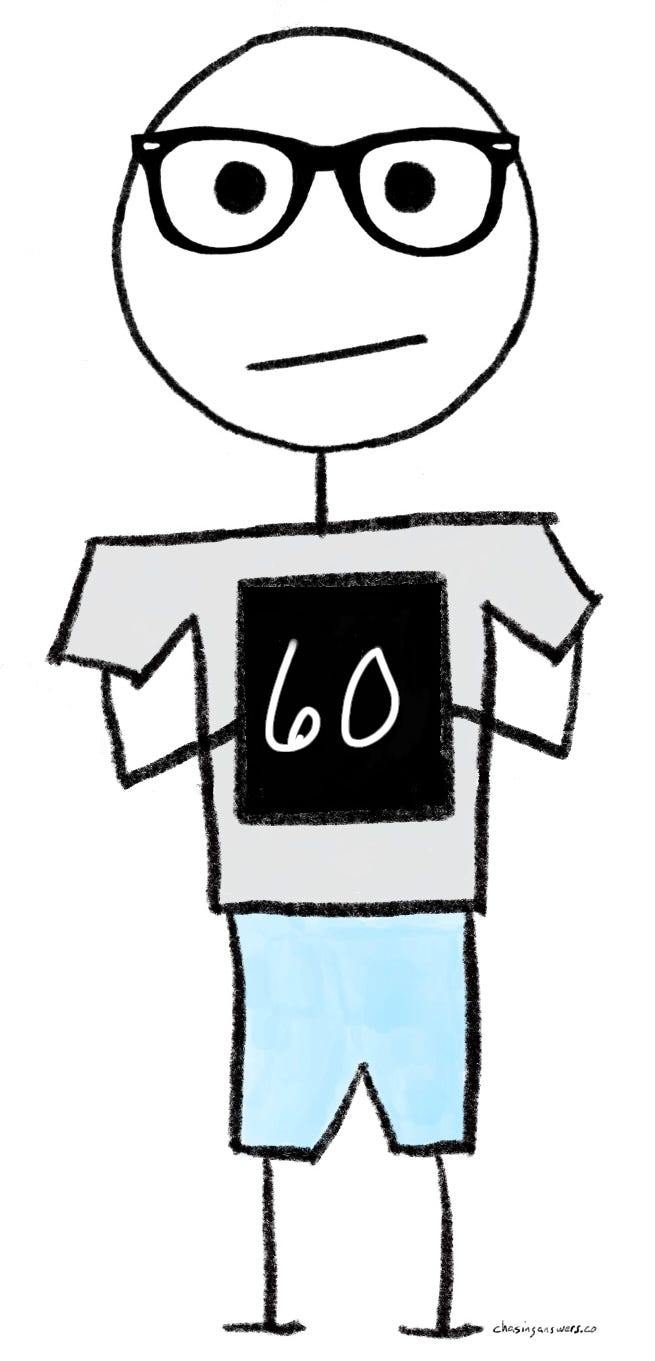chasing answers newsletter #60
The Diderot Effect
“Too many people spend money they haven’t earned to buy things they don’t want, to impress people that they don’t like.” - Will Rogers
Happy Sunday!
It’s summertime. That means my wife and daughter are off work and school for the next couple of months, and we’ll be going on a few family vacations. So, my bandwidth for writing is at a low point right now.
For that reason, I will try to keep my newsletters short and succinct for the next two months.
Starting next week.
Today, I’m taking a look at the Diderot Effect. I stumbled upon this idea recently while researching the history of consumerism, a topic I want to write a lot more about in the future. I believe consumerism is one of the chief problems that need to be addressed if we are going to stand a chance against climate change. We simply can’t sustain the rates at which we are currently producing and consuming.
I have a lot of thoughts on this topic. Too many. So, today we’re just looking at one tiny sliver of the problem.
The Diderot Effect is an interesting consumer behavior. It is named after the French philosopher Denis Diderot, who, in 1769, wrote a fictional essay titled “Regrets on Parting with My Old Dressing Gown” about the phenomenon.
The underlying principle of the Diderot Effect is simple. Purchasing one new item, whether it is something we need or not, often turns into the purchase of several additional items that we most likely do not need.
In Diderot’s essay, he was gifted a new scarlet gown. Diderot was not a wealthy individual, and he was depressed that his other belongings did not measure up to the extravagant gown. So he began to purchase new items that were both unnecessary and beyond his means in an attempt to match the lavishness of his new gift.
This ultimately led to indebtedness and despair for Diderot, who wrote in the essay that he had become enslaved to the new gown.
When I first read Diderot’s essay, I thought, “That’s a nice story with a good lesson, but who would do that?”
It turns out I do it all the time.
Not long after reading about the Diderot Effect, I fell victim to it in the most perfect way possible.
A couple of weeks ago, I wrote that I am finally taking the time to learn photography and focus on improving my skills in photographing wildlife.
So, I decided to upgrade my camera. I didn’t “need” a new camera. I wanted one. I researched the latest cameras on the market and decided on one that would cost a few thousand dollars. Expensive, but an investment I was willing to make. Or so I thought.
More research revealed that many of the lenses I own wouldn’t work with the new camera, so I needed some new lenses. My memory cards wouldn’t work either, so I needed to purchase new (more expensive) memory cards. And since I was going to spend so much on all this new equipment, I thought I should get a new (“better”) camera bag to protect all of it.
$9,600
That’s what my shopping cart totaled by the time I got done adding all the accessories and extra “needs” to get the most out of my new camera.
WTF??
I thought I was too smart to fall victim to such silly behavior, but I was clearly wrong.
And as if it isn’t hard enough to avoid this trap on our own, retailers are well aware of this weakness and use it to their advantage.
When you buy something online, and the little box pops up showing you items that work well with your purchase, they are attempting to trigger the Diderot Effect. After all, it would be a shame to use that crappy old monitor of yours with that blazing-fast computer you just purchased, right? Better get a new monitor too.
The Diderot Effect is just one facet of the consumerist economy we all live in. A system created to convince us that more is better and that happiness is one purchase away.
The next time you make a new purchase, don’t fall victim to the Diderot Effect like I almost did.
By the way, I’m still shopping for a new camera.
Photos(s) of the Week
I’m not the only one in our house who's been focusing on their photography skills. My daughter has taken an interest as well. I now have to fight her for camera time.
I hope you all have a great week!
If you want to see more of my work, please visit chasinganswers.co.
Thank you for reading, and if you liked what you read, please share.
randy




Don't know what you used to take that beautiful photo of your daughter, but clearly you don't need a new camera. But hearing about the Diderot effect is useful, the way it's always useful to be made aware of unconscious tendencies that can be approached with more intentionality once you know they're at play. It seems this same psychology could be part of perfectionism. Like if someone praises you or gives you acknowledgment for being good at something you then feel the need to expand your territory around that talent, or skill, or trait to match the newly acquired ownership of a facet of identity. Ok, maybe that's a stretch, but as a perfectionist myself, that's what came to mind.
Oh, Denis.
"There was a vacant corner next to my window. This corner asked for a writing desk, which it obtained."
You didn't ask for a new lens or memory cards, Randy!! The camera did!! Which it did not obtain.
Yay for #60!! Love the photo of your little photographer. Hope we get to see some of her work 🙂